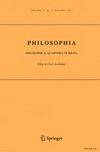开垦与授权:塞波拉罗和洛佩兹-德-萨关于组内限制
IF 0.5
4区 哲学
0 PHILOSOPHY
引用次数: 0
摘要
人们普遍认为,污言秽语的使用仅限于本群体。比安卡-塞波拉罗(Bianca Cepollaro)和丹-洛佩兹-德-萨(Dan Lopez de Sa)通过介绍外群体成员成功开垦污言秽语的案例,对这一假设提出了质疑。我同意这种观点,即外群体往往参与了 "回收"。在本文中,我提出了一种观点,这种观点考虑到了外群体有时会成功地收回污言秽语这一事实。同时,该观点保留了本群体在开垦中的核心作用。本文章由计算机程序翻译,如有差异,请以英文原文为准。
Reclamation and Authorization: Cepollaro and Lopez de Sa on in-group Restriction
It is generally thought that the reclamation of slurs is restricted to the in-group. Bianca Cepollaro and Dan Lopez de Sa challenge this assumption by presenting cases in which slurs are successfully reclaimed by members of out-groups. I agree with the idea that the out-groups often participate in reclamation. In this paper, I present a view which accommodates the fact that sometimes out-groups successfully reclaim slurs. At the same time, the view preserves the central role of the in-group in reclamation.
求助全文
通过发布文献求助,成功后即可免费获取论文全文。
去求助
来源期刊

PHILOSOPHIA
PHILOSOPHY-
CiteScore
0.90
自引率
20.00%
发文量
141
期刊介绍:
Founded in 1971, Philosophia is a much-respected journal that has provided a platform to many well-known philosophers, including Kenneth Arrow, A.J. Ayer, Roderick Chisholm, Bas van Fraassen, William Frankena, P.T. Geach, Alan Gewirth, Jaakko Hintikka, Richard Popkin, W.V.O. Quine, Gilbert Ryle, Marcus Singer, Peter Singer, J.J.C. Smart, P.F. Strawson, and many others. Philosophia also published papers of Ludwig Wittgenstein and Rudolf Carnap.
Philosophia is an international journal in scope, submissions and readership. The journal publishes contributions fitting within various philosophical traditions, but manifests a preference of the analytic tradition in the broad sense of commitment to clarity and responsibility.
Besides papers in the traditional subfields of philosophy and its history, Philosophia also publishes work on topical subjects such as racism, silence of God, terrorism, the nature of philosophy, emotion, AIDS, scientific discovery, punishment, modality, and institutional theory of art.
Philosophia welcomes a wide range of contributions to academic philosophy, covering all fields of philosophy. Contributions to the journal may take the form of topical papers, philosophical surveys of literature, symposia papers, short discussion notes, puzzles, profiles, book reviews and more extensive critical studies of new books. The journal includes a ''books revisited'' section where a book and its impact are reconsidered a decade or more after its appearance. Double-blind review procedure The journal follows a double-blind reviewing procedure. Authors are therefore requested to place their name and affiliation on a separate page. Self-identifying citations and references in the article text should either be avoided or left blank when manuscripts are first submitted. Authors are responsible for reinserting self-identifying citations and references when manuscripts are prepared for final submission.Please read our Editorial Policies carefully before you submit your paper to this journal https://www.springer.com/gp/editorial-policies
 求助内容:
求助内容: 应助结果提醒方式:
应助结果提醒方式:


